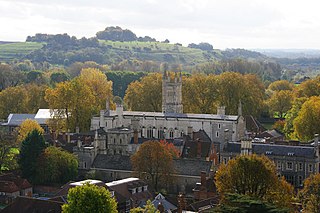
Winchester College is an English public school with some provision for day attendees, in Winchester, Hampshire, England. It was founded by William of Wykeham in 1382 as a feeder school for New College, Oxford, and has existed in its present location ever since. It is the oldest of the nine schools considered by the Clarendon Commission. The school has begun a transition to become co-educational, and has accepted male and female day pupils from September 2022, having previously been a boys' boarding school for over 600 years.
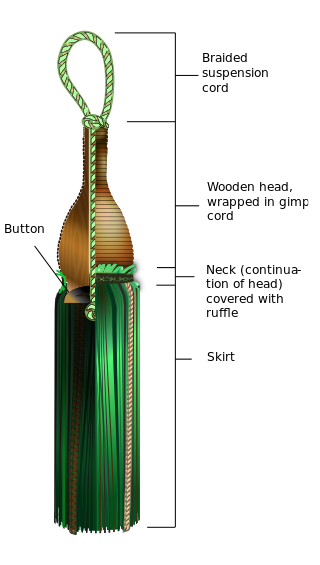
A tassel is a finishing feature in fabric and clothing decoration. It is a universal ornament that is seen in varying versions in many cultures around the globe.

At Trinity College Dublin and the University of Cambridge, a sizar is an undergraduate who receives some form of assistance such as meals, lower fees or lodging during his or her period of study, in some cases in return for doing a defined job.

The University of Oxford has a long tradition of academic dress, which continues to the present day.

John Percival Postgate, FBA was an English classicist and academic. He was a fellow of Trinity College, Cambridge from 1878 until his death, and also taught at Girton College, Cambridge (1877–1909) and University College, London (1880–1908). Having been passed over for the Chair of Latin at the University of Cambridge, he was Professor of Latin at the University of Liverpool from 1909 to 1920. He was a member of the Postgate family.
In real estate, a landed property or landed estate is a property that generates income for the owner without the owner having to do the actual work of the estate.
In certain universities, a servitor was an undergraduate student who received free accommodation, and was exempted from paying fees for lectures. The term is still used at the University of Edinburgh, where it refers to the staff who are responsible for security, mail and reception and are also on duty at formal occasions, when their functions include carrying the mace and ushering.
In the universities of Oxford, Cambridge, and Dublin, Bachelors of Arts (BAs) are promoted to the rank of Master of Arts (MA), typically upon application after three or four years after graduation. No further examination or study is required for this promotion, which is a mark of seniority rather than an additional postgraduate qualification.
A pensioner is a person who receives a pension, most commonly because of retirement from the workforce. This is a term typically used in the United Kingdom, Ireland and Australia where someone of pensionable age may also be referred to as an 'old age pensioner'. In the United States, the term retiree is more common, and in New Zealand, the term superannuitant is commonly used. In many countries, increasing life expectancy has led to an expansion of the numbers of pensioners, and they are a growing political force.
An exhibition is a type of historical financial scholarship or bursary awarded in the United Kingdom and Ireland.
Dominus is the Latin word for master or owner. Dominus was used as a Roman imperial title. It was also the Latin title of the feudal, superior and mesne, lords, and an ecclesiastical and academic title. The ecclesiastical title was rendered through the French seigneur in English as sir, making it a common prefix for parsons before the Reformation, as in Sir Hugh Evans in Shakespeare's Merry Wives of Windsor. Its shortened form Dom remains used as a prefix of honor for ecclesiastics of the Catholic Church, and especially for members of the Benedictine and other religious orders. The title was formerly also used as is, Dominus, for a Bachelor of Arts.

Thomas Jones was Head Tutor at Trinity College, Cambridge, for twenty years and an outstanding teacher of mathematics. He is notable as a mentor of Adam Sedgwick.

D'Ewes Coke was rector of Pinxton and South Normanton in Derbyshire, a colliery owner and philanthropist.
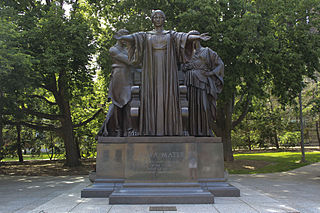
Alumni are former students or graduates of a school, college, or university. The feminine plural alumnae is sometimes used for groups of women, and alums or alumns as gender-neutral alternatives. The word comes from Latin, meaning nurslings, pupils or foster children, derived from alere "to nourish".
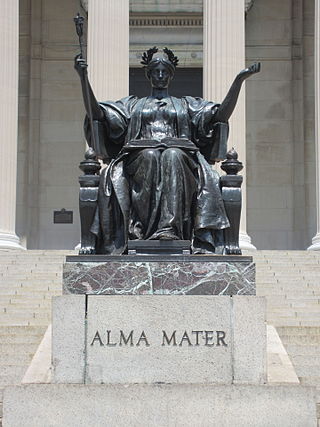
A university is an institution of higher education and research which awards academic degrees in several academic disciplines. University is derived from the Latin phrase universitas magistrorum et scholarium, which roughly means "community of teachers and scholars". Universities typically offer both undergraduate and postgraduate programs.

Academic dress prescribed at the Trinity College Dublin follows a relatively complex protocol which, nonetheless, shares some particular characteristics with other universities in Ireland and with its sister institutions at the University of Oxford and University of Cambridge in the United Kingdom.
Saltings were festive ceremonies which, in the sixteenth and seventeenth centuries, initiated Cambridge and Oxford freshmen into the academic and social communities of their individual colleges. Humorous speeches by one or more sophisters introduced first-year students to the assembled college society. Recently texts of several salting speeches have been identified. Relatively little is known about the conventions governing these entertainments; when the tradition died out in the mid-seventeenth century, most of the performance details were lost as well. Nevertheless, elements of the tradition are preserved in the texts and may be amplified by students' diaries, tutors' account books, and university statutes regulating the custom.
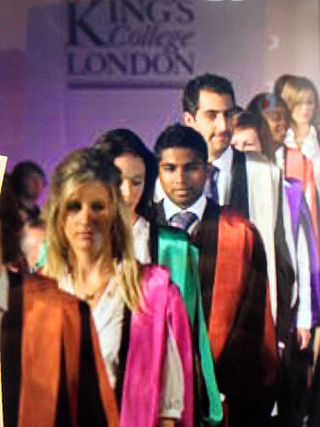
The academic dress of the United Kingdom and Ireland has a long history and has influenced the academic dress of America and beyond. The academic square cap was invented in the UK as well as the hood which developed from the lay dress of the medieval period.

William Lax was an English astronomer and mathematician who served as Lowndean Professor of Astronomy and Geometry at the University of Cambridge for 41 years.
William Nichols Higton (1796–1867) was an English clergyman, and philanthropist who is best known for his work for the Booth Charities. He was also a Fellow of the Royal Manchester Institute, Founding Member of the Art Union of London, and Member of the British Archaeological Association. The family's association with Manchester derived from the Cotton Industry, with a Cotton Mill and Counting House on Ancoats Lane.













